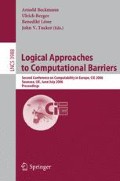Abstract
A fundamental problem about the strength of non-deterministic computations is the problem whether the complexity class \({\cal N}{\cal P}\) is closed under complementation. The set TAUT (w.l.o.g. a subset of {0,1}*) of propositional tautologies (in some fixed, complete language, e.g. DeMorgan language) is co\({\cal N}{\cal P}\)-complete. The above problem is therefore equivalent to asking if there is a non-deterministic polynomial-time algorithm accepting exactly TAUT.
Cook and Reckhow (1979) realized that there is a suitably general definition of propositional proof systems that encompasses traditional propositional calculi but links naturally with computational complexity theory. Namely, a propositional proof system is defined to be a binary relation (on {0,1}*) P(x,y) decidable in polynomial time such that x ∈TAUT iff ∃ y, P(x,y). Any y such that P(x,y) is called a P-proof of x.
It is easy to see (viz Cook and Reckhow (1979)) that the fundamental problem becomes a lengths-of-proofs question: Is there a propositional proof system in which every tautology admits a proof whose length is bounded above by a polynomial in the length of the tautology?
Access this chapter
Tax calculation will be finalised at checkout
Purchases are for personal use only
References
Cook, S.A., Reckhow, R.A.: The relative efficiency of propositional proof systems. J. Symbolic Logic 44(1), 36–50 (1979)
Krajíček, J.: Bounded arithmetic, propositional logic, and complexity theory. In: Encyclopedia of Mathematics and Its Applications, vol. 60.Cambridge University Press, Cambridge (1995)
Krajíček, J.: Forcing with random variables. A draft of lecture notes available at, http://www.math.cas.cz/~krajicek
Author information
Authors and Affiliations
Editor information
Editors and Affiliations
Rights and permissions
Copyright information
© 2006 Springer-Verlag Berlin Heidelberg
About this paper
Cite this paper
Krajíček, J. (2006). Forcing with Random Variables and Proof Complexity. In: Beckmann, A., Berger, U., Löwe, B., Tucker, J.V. (eds) Logical Approaches to Computational Barriers. CiE 2006. Lecture Notes in Computer Science, vol 3988. Springer, Berlin, Heidelberg. https://doi.org/10.1007/11780342_29
Download citation
DOI: https://doi.org/10.1007/11780342_29
Publisher Name: Springer, Berlin, Heidelberg
Print ISBN: 978-3-540-35466-6
Online ISBN: 978-3-540-35468-0
eBook Packages: Computer ScienceComputer Science (R0)

